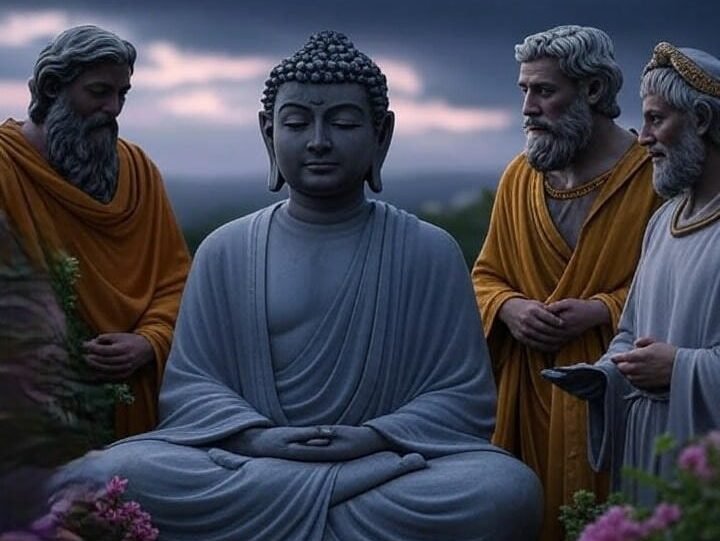Why the radical middle way means zero burnouts
There’s a kind of peace that chaos can’t reach.
Not the peace of a retirement plan or a silent retreat with artisanal tea. Not the kind that comes from counting breaths in a candlelit room. I mean a peace that’s quieter than all that. One that doesn’t need props or performances. One that’s already here, if we stop chasing and start noticing.
The Greeks called it ataraxia. A kind of unshakable ease. And Epicurus, of all people, made it the centerpiece of his philosophy.
Most people today either haven’t heard of Epicurus or think he was the ancient world’s version of a party animal. Wine, pleasure, indulgence. But the real Epicurus would have turned down the invite. He wasn’t a hedonist in the modern sense. He was a minimalist in the deepest sense: clear-headed, calm, and radically content with very little.
Let’s take a fresh look at what Epicurus really taught, and then line it up next to Aristotle and the Buddha—two immortal greats who, in their own ways, pointed to the same: that true happiness is the peace that doesn’t live at the extremes. It waits, patiently, in the middle.
Table of contents
Epicurus: the art of needing little
Epicurus (341–270 BCE) started his own school, but not like the others. No public debates on marble steps. He gathered friends in a garden. Casual, thoughtful, grounded. More than just scenery, his Garden was a symbol of how he wanted to live and teach: outside the chaos, close to nature and friends, rooted in simplicity.
He said the point of life is pleasure, but not the loud kind. He divided pleasure into three types:
- Natural and necessary – food, shelter, friendship.
- Natural but unnecessary – luxury, variety, comfort.
- Neither natural nor necessary – fame, power, wealth.
The first type gives us real peace. The rest just stir the pot.
Ataraxia, for Epicurus, meant freedom from mental disturbance. Not euphoria—just deep, quiet ease. The kind you get when you realize you already have enough. When your desires shrink to fit your true nature instead of inflating to chase illusions.
He put it plainly: “It is impossible to live a pleasant life without living wisely and honorably and justly.” Not quite the motto of a wild hedonist. Epicurus believed most suffering comes from fear. Fear of pain, of the gods, of death. Philosophy, he said, should help us see through those fears. Like medical therapy, but aimed at the soul instead of the body.
And if you strip away fear, what’s left isn’t numbness. It’s presence. Epicurus knew that resting in our true nature is enough for happiness!
Aristotle: becoming who you already are
.While Epicurus aimed for peace through simplicity, Aristotle took a more dynamic route. His notion of eudaimonia—often translated as flourishing or happiness—wasn’t about minimizing desire but fulfilling human potential. Aristotle argued that happiness is the ultimate goal because it’s the only thing we seek for its own sake. Everything else we want because we think it will make us happy!
For the proto-biologist extraordinaire Aristotle, human beings are rational animals. So, to flourish is to reason well, live virtuously, and take part in the life of the polis. Virtue is key: to strike the mean between excess and deficiency. Courage lies between cowardice and rashness. Generosity between miserliness and extravagance. This isn’t about rules but balance, tuning your character. Like an instrument.
Aristotle believed we become virtuous by practicing virtue. Just like you learn to play piano by playing it. And the good life isn’t found by retreating from the world, but by engaging with it—honestly, skillfully, meaningfully. That said, even Aristotle held up the golden mean—the middle way between too much and too little—as the path to peace.
So if Epicurus invites us to rest, Aristotle challenges us to move—but in rhythm with the human rational nature. Happiness is the peace found by enacting nature!
The Buddha: nothing to hold on to
Now let’s jump east.
About two hundred years before Epicurus, the Buddha sat under a tree and saw something most people spend lifetimes avoiding: that much of what we chase isn’t just unhelpful but the source of our suffering.
The Buddha’s first truth was simple: life includes dukkha—suffering, friction, unease. Not all the time, but inevitably. And the cause of that suffering? Tanha—craving. The itch that never gets scratched. And that’s not just craving material pleasures. It’s craving stability, identity, control. Wanting life to be other than it is.
His solution wasn’t to manage desire like Epicurus or refine it like Aristotle, but to see through it. When you realize there’s no fixed self doing the craving—just patterns, habits, thoughts—something loosens. You don’t conquer craving, but it dissolves when it’s no longer fed.
This insight leads to what the Buddha called The Middle Way: a path between self-indulgence and self-denial, between clinging and rejecting, between being someone and trying to be no one. It’s the path of simply seeing things as they are. The Buddha offered a different way of looking, a perspective to cut through the noise. And when the noise drops?
Ataraxia, by another name.
Same peace, different routes
So what do these three ancient voices have in common?
- Epicurus says: Let go of what disturbs you. Peace is needing less.
- Aristotle says: Become who you are through balance and reason. Peace is growing into yourself.
- The Buddha says: See through the illusion of self and craving. Peace is what’s left when there’s no one left to suffer.
Different language language and methods. But they’re all pointing to the same quiet center: the radical middle way of the present, unconditionally. Not a compromise or a lukewarm version of extremes, but a return to sanity, a way of living in tune. In a world where algorithms weaponize desire and anxiety, this feels less like ancient wisdom and more like essential medicine.
The nondual take
If you’ve explored rational nondualism, you know it doesn’t play favorites. It sees through systems to what they’re grounded in: the immediate, ungraspable, always-present now. Epicurus, Aristotle, and the Buddha each offer ways to meet life more clearly. But none of their paths are separate from the one who walks them. That each of us s already whole—and always was.
So we can even throw in a little extra: Stoicism. Zeno of Citium, the founder of Stoicism, taught that virtue lies in accepting fate with unflinching clarity—as if life itself were a role assigned by nature, not by preference. “To be happy,” he said, “is to live in accordance with reason and nature”—even if that means, as he put it, “taking on the complexion of the dead.”
Far from apathy, it’s the Stoic version of the middle way—where resistance to what is falls away, just like in Buddhism and nonduality, and peace arises not from control but from coherence with the present. Nonduality begins where striving ends. It’s not about improvement or escape. It’s about recognizing that the peace you were seeking was never outside you. It’s what’s looking right now!
In that light, Epicurean ease, Aristotelian flourishing, Stoic love of fate, and Buddhist awakening all become different faces of the same truth. Not something to chase, just something to notice.
Last words from the Garden
Picture yourself sitting in the Garden beneath a tree. It’s warm. The light is soft.
- Epicurus is to your left. He smiles gently. “Avoid unnecessary pain,” he says. “Live simply.”
- Aristotle is to your right. His gaze is alert. “Cultivate your gifts,” he says. “Align with your purpose.”
- The Buddha is before you. He says nothing.
And then even the tree, even the silence, even the self—dissolve into the present.
That’s the radical middle way, seen not as a compromise but as a return to natural intuition, to spontaneity. A homecoming without a traveler. No goals, no seeking, just presence. The middle way isn’t a path you find but the place you never left.
And ataraxia? That’s not a prize. It’s a birthright.
You can support Marcel’s work , find gifts, and amp up your style at Marcel’s Booktique.
His books—in paper, pixel, and audio—can also be found at Amazon and other select retailers.
Looking for mindful & funny spiritual gifts, gear, deco, or gadgets? Why not check out the affordable Amazon Merch custom designs by Simply Nondual!
Share this article:





[…] Reason clears the fog; awareness dissolves the wheel. Combine them, and you get a philosophy that both makes sense and makes you free: Rational Nondualism. Reason, if understood and applied judiciously, greatly reduces suffering. It supports the revelation of our nondual nature and the identification of toxic desires, as discussed in my previous post about happiness. […]